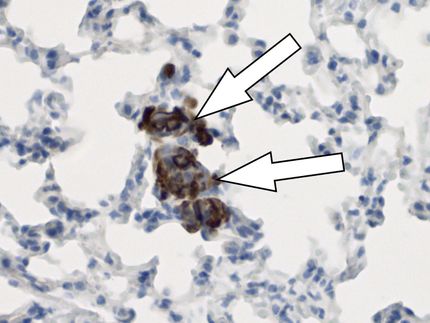New 'suicide' molecule halts rheumatoid arthritis
Researcher invents nontoxic drug that forces hyperactive immune cells to die
Advertisement
A researcher from Northwestern University Feinberg School of medicine has invented a novel way to halt and even reverse rheumatoid arthritis. He developed an imitation of a suicide molecule that floats undetected into overactive immune cells responsible for the disease. Whimsically referred to as Casper the Ghost, the stealthy molecule causes the immune cells to self-destruct. The approach, tested on mice, doesn't carry the health risks of current treatments. The study will be published in arthritis & Rheumatism.
"This new therapy stopped the disease cold in 75 percent of the mice," reported Harris Perlman, the lead author and an associate professor of medicine at Feinberg. "The best part was we didn't see any toxicity. This has a lot of potential for creating an entirely new treatment for rheumatoid arthritis."
Healthy immune cells are supposed to die after they attack an invading virus or bacteria. But in rheumatoid arthritis, the immune cells called macrophages live and go rogue. They proliferate in the blood, build up in the joints and invade cartilage and bone. Currently, there is no effective, nontoxic way to stop them.
Perlman discovered that immune cells in rheumatoid arthritis are low in a critical molecule called Bim, whose job is to order the cells to self-destruct. To correct that shortage, Perlman developed an imitation of the molecule, called BH3 mimetic. When Harris injected his drug into mice with rheumatoid arthritis, it floated ghostlike into their macrophages and bam!, the misbehaving immune cells self destructed.
In his research, Harris showed the molecule could prevent the development of rheumatoid arthritis as well as trigger a remission of existing disease. After the drug was injected in animals with the disease, joint swelling was reduced and bone destruction decreased.
Most read news
Topics
Organizations
Other news from the department science

Get the life science industry in your inbox
By submitting this form you agree that LUMITOS AG will send you the newsletter(s) selected above by email. Your data will not be passed on to third parties. Your data will be stored and processed in accordance with our data protection regulations. LUMITOS may contact you by email for the purpose of advertising or market and opinion surveys. You can revoke your consent at any time without giving reasons to LUMITOS AG, Ernst-Augustin-Str. 2, 12489 Berlin, Germany or by e-mail at revoke@lumitos.com with effect for the future. In addition, each email contains a link to unsubscribe from the corresponding newsletter.


























































